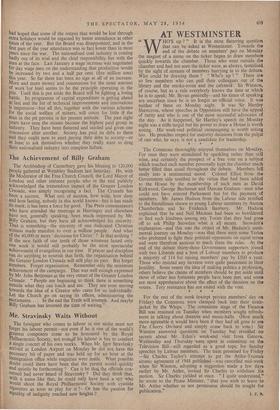AT WESTMINSTER
HO'S up ? " It is the most flattering question that can be asked at Westminster. Towards the end of the debate on members' pay on Monday the magnet of a name on the ticker began to draw members quickly towards the chamber. Those who were outside the chamber and had not seen the ticker were, as always, tantalised by the sight of streams of members hurrying in to the debate. Who could be drawing them ? "Who's up ? " There are so few members who can pull their colleagues out of the library and the smoke-room and the cafeteria : Sir Winston, of course, but as a rule everybody knows the time at which he is to speak; Mr. Bevan generally—and his times of speaking are uncertain since he is no longer an official voice. It was neither of these on Monday night. It was Sir Hartley Shawcross, whose speeches in Opposition still have the appeal of rarity and who is one of the most successful advocates of the day. As it happened, Sir Hartley's speech on Monday night was a trifle turgid but his power to draw a House is worth noting. His week-end political campaigning is worth noting too. He preaches respect for majority decisions from the pulpit of one who, he says, is not a candidate for leadership. * * * The Commons thoroughly enjoyed themselves on Monday. For once they were stimulated by sparkling rather than still wine, and certainly the prospect of a free vote on a subject which touched each member personally kept the chamber much better filled than usual throughout the debate. Members fell easily into a sentimental mood. Colonel Elliot from the Government side testified to the virtue that had been added to the House by the membership of such men as David Kirkwood, George Buchanan and Duncan Graham—men who could not have entered Parliament but for the payment of members. Mr. James Hudson from the Labour side testified to the friendliness shown to young Labour members by Austen Chamberlain and Sir Frederick Banbury. Mr. Hudson explained that he and Neil Maclean had been so bewildered to find such kindness among any Tories that they had gone off to ask Philip Snowden what it all meant. Snowden's explanation—and this was the object of Mr. Hudson's send- mental journey on Monday—was that there were some Tories who preferred to fight their political opponents on equal terms and were therefore anxious to teach them the rules. At the end of the debate thirty-three Government supporters joined with two Liberals and a host of Labour members to produce a majority of 114 for raising members' pay by £500 a year. Those who resisted any increase were quite passionate in their hostility. Some resent the idea of making politics a profession, others believe the claims of members should be put aside until those of other less fortunate people have been met, and some are most apprehensive about the effect of the decision on the voters. Tory resistance has not ended with the vote. * * For the rest of the week (except private members day on Friday) the Commons were clamped back into their strait- jacket by the Whips. The committee stage of the Finance Bill was resumed on Tuesday when members sought refresh- ment in talking about theatres and music-halls. (How much more agreeable it would have been if they had all gone to see The Cherry Orchard and simply come back to vote.) Sir Winston answered questions on Tuesday but revealed no secrets about Mr. Eden's week-end visit from Geneva. Wednesday and Thursday were spent in committee on the Television Bill—still regarded as a good topic for Sunday speeches by Labour members. The treat promised for Friday —Sir Charles Taylor's attempt to get the Attlee-Truman atomic agreement of 1948 published—was cancelled mid-week when Sir Winston, adopting a suggestion made a few days earlier by Mr. Attlee, invited Sir Charles to withdraw his motion. Sir Charles yielded at once. "I quite understand." he wrote to the Prime Minister, "that you wish to leave to Mr. Attlee whether or not permission should be sought for


































































 Previous page
Previous page